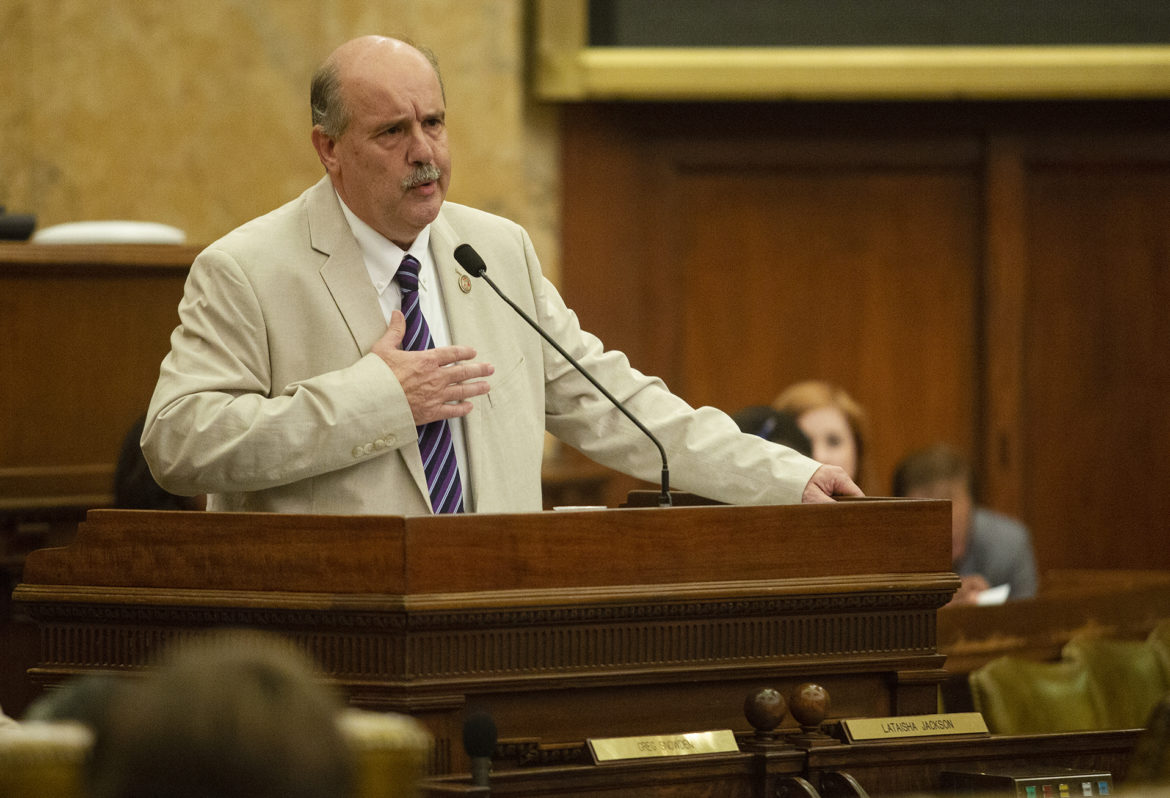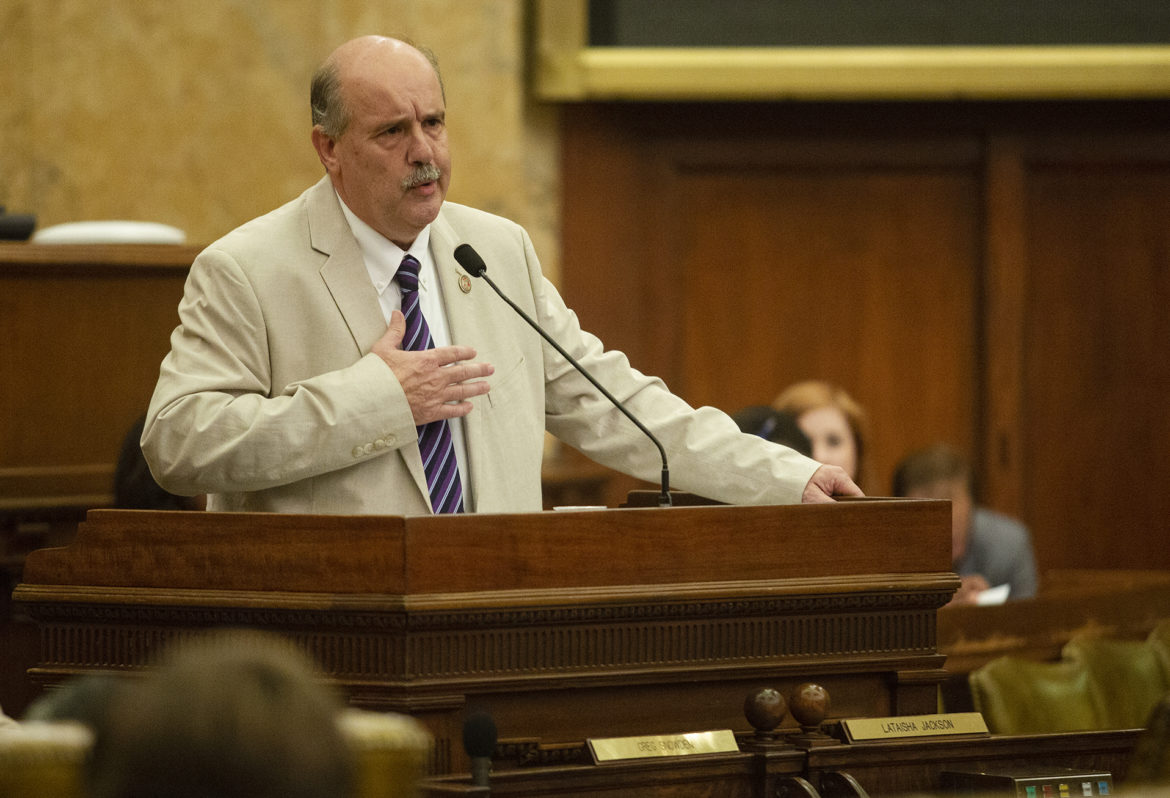Mississippi Today
Lawmaker kills bill to raise truancy officer pay after it passed unanimously in the Senate


Lawmaker kills bill to raise truancy officer pay after it passed unanimously in the Senate
Terri Hill from Jones County has been working as a school attendance officer for 26 years. After taxes, she takes home about $28,000.
Legislation to increase the base salary for Hill and her colleagues — who were left out of teacher and state worker pay raises in recent years — passed the Senate unanimously but was killed last week by House Education Committee Chair Richard Bennett, R-Long Beach.
“He is a brick wall that we can’t get around,” said April Brewer, the school attendance officer for Lamar County.
Brewer, a mother of seven, has been at the job for 11 years. But with a $30,000 salary, she’s had to consistently work two additional jobs.
Bennett did not return several Mississippi Today efforts to reach him for comment.
With such low pay, the Mississippi Department of Education has a hard time retaining these workers, who, when effective, play a significant role in the wellbeing of children in Mississippi.
READ MORE: State truancy officers face stagnant pay and ‘unmanageable caseloads’
The shortage of attendance officers in the state has resulted in massive, unmanageable caseloads, the officers say. In some counties, one officer is responsible for as many as 10,000 students. When this happens, officers get too many referrals for children missing school that they can’t adequately assess the problem and try to address the students’ needs.
These state workers are direct employees of MDE but work locally in each county. They work in different offices, some stationed inside school district buildings while others work out of local courthouses.
Spread out and tucked away, this is likely one reason the officers feel they’ve been so ignored.
Mississippi Today spoke with several school attendance officers in the fall who said MDE has not consistently supplied them with the materials they need: paper, ink, and stamps for the letters they’re required by law to send to the parents of truant children. They say they’ve also had trouble getting reimbursed for the travel expenses they incur making home visits to find out why kids are not in school. Brewer said these issues persist.
“The Mississippi Department of Education understands the Student Attendance Officers’ concerns and plans to continue working with the Legislature as it relates tooverall agency funding,” MDE said to Mississippi Today in a statement Friday.
MDE has proposed the solution of moving school attendance officers to the local school districts. But bills to accomplish this also died this legislative session.
Brewer said that option, however, presents a possible conflict of interest. Part of a school attendance officer’s job is to ensure that the state’s truancy statutes are being followed — and that includes by schools. An example is the requirement that schools allow homeless students to enroll.
“How do we tell our superintendent, ‘You’re not complying with the law,’ when they can just say, ‘Hey, you work for me,’” Brewer said.
School attendance officers also work with kids outside the public school districts — homeschool and private school students — and Brewer worries that being employees of the school district could prevent officers from working in the best interest of all students.
Brenda Scott, longtime president of the Mississippi Alliance of State Employees workers union, is representing the officers at the legislature this session. She recognizes that it often takes years for lobbying efforts to bear fruit.
Currently, school attendance officers must have at least a bachelor’s degree and their salaries are set in statute. After 17 years, an officer with a bachelor’s degree can earn no more than $31,182. With a master’s degree, they can start out making $26,000 and cap out at $37,000 after 21 years.
“He (Rep. Bennett) thinks that they’re receiving adequate pay and I just don’t see how he could think that,” Scott said.
Their bill, Senate Bill 2777, would have increased the baseline pay for school attendance officers by $5,000, bringing the floor for workers with a bachelor up from $24,500 to $29,500.
With her 11 years, Brewer’s salary would increase to a minimum of $39,050. The starting pay for public school teachers is $41,500.
The bill also included a new $250,000 cap on the salary for the state superintendent, who currently earns $300,000.
Brewer said they had enough support in both the Education Committee and full House of Representatives to get the bill passed. But Bennett would not take up the bill in his committee. It’s still possible for the Senate to amend the existing House education appropriations bill to include the changes, but then the legislation would have to go to conference in the House, potentially meeting the same hurdle.
Brewer said that the school attendance officer in Bennett’s hometown, Long Beach, is “also in a county with over 30,000 students and there’s only two workers.”
“It’s not going to get better,” she said.
This article first appeared on Mississippi Today and is republished here under a Creative Commons license.
Mississippi Today
On this day in 1977, Alex Haley awarded Pulitzer for ‘Roots’

April 19, 1977

Alex Haley was awarded a special Pulitzer Prize for “Roots,” which was also adapted for television.
Network executives worried that the depiction of the brutality of the slave experience might scare away viewers. Instead, 130 million Americans watched the epic miniseries, which meant that 85% of U.S. households watched the program.
The miniseries received 36 Emmy nominations and won nine. In 2016, the History Channel, Lifetime and A&E remade the miniseries, which won critical acclaim and received eight Emmy nominations.
This article first appeared on Mississippi Today and is republished here under a Creative Commons Attribution-NoDerivatives 4.0 International License.![]()
Mississippi Today
Speaker White wants Christmas tree projects bill included in special legislative session

House Speaker Jason White sent a terse letter to Lt. Gov. Delbert Hosemann on Thursday, saying House leaders are frustrated with Senate leaders refusing to discuss a “Christmas tree” bill spending millions on special projects across the state.
The letter signals the two Republican leaders remain far apart on setting an overall $7 billion state budget. Bickering between the GOP leaders led to a stalemate and lawmakers ending their regular 2025 session without setting a budget. Gov. Tate Reeves plans to call them back into special session before the new budget year starts July 1 to avoid a shutdown, but wants them to have a budget mostly worked out before he does so.
White’s letter to Hosemann, which contains words in all capital letters that are underlined and italicized, said that the House wants to spend cash reserves on projects for state agencies, local communities, universities, colleges, and the Mississippi Department of Transportation.
“We believe the Senate position to NOT fund any local infrastructure projects is unreasonable,” White wrote.
The speaker in his letter noted that he and Hosemann had a meeting with the governor on Tuesday. Reeves, according to the letter, advised the two legislative leaders that if they couldn’t reach an agreement on how to disburse the surplus money, referred to as capital expense money, they should not spend any of it on infrastructure.
A spokesperson for Hosemann said the lieutenant governor has not yet reviewed the letter, and he was out of the office on Thursday working with a state agency.
“He is attending Good Friday services today, and will address any correspondence after the celebration of Easter,” the spokesperson said.
Hosemann has recently said the Legislature should set an austere budget in light of federal spending cuts coming from the Trump administration, and because state lawmakers this year passed a measure to eliminate the state income tax, the source of nearly a third of the state’s operating revenue.
Lawmakers spend capital expense money for multiple purposes, but the bulk of it — typically $200 million to $400 million a year — goes toward local projects, known as the Christmas Tree bill. Lawmakers jockey for a share of the spending for their home districts, in a process that has been called a political spoils system — areas with the most powerful lawmakers often get the largest share, not areas with the most needs. Legislative leaders often use the projects bill as either a carrot or stick to garner votes from rank and file legislators on other issues.
A Mississippi Today investigation last year revealed House Ways and Means Chairman Trey Lamar, a Republican from Sentobia, has steered tens of millions of dollars in Christmas tree spending to his district, including money to rebuild a road that runs by his north Mississippi home, renovate a nearby private country club golf course and to rebuild a tiny cul-de-sac that runs by a home he has in Jackson.
There is little oversight on how these funds are spent, and there is no requirement that lawmakers disburse the money in an equal manner or based on communities’ needs.
In the past, lawmakers borrowed money for Christmas tree bills. But state coffers have been full in recent years largely from federal pandemic aid spending, so the state has been spending its excess cash. White in his letter said the state has “ample funds” for a special projects bill.
“We, in the House, would like to sit down and have an agreement with our Senate counterparts on state agency Capital Expenditure spending AND local projects spending,” White wrote. “It is extremely important to our agencies and local governments. The ball is in your court, and the House awaits your response.”
This article first appeared on Mississippi Today and is republished here under a Creative Commons Attribution-NoDerivatives 4.0 International License.
Mississippi Today
Advocate: Election is the chance for Jackson to finally launch in the spirit of Blue Origin

Editor’s note: This essay is part of Mississippi Today Ideas, a platform for thoughtful Mississippians to share fact-based ideas about our state’s past, present and future. You can read more about the section here.
As the world recently watched the successful return of Blue Origin’s historic all-women crew from space, Jackson stands grounded. The city is still grappling with problems that no rocket can solve.
But the spirit of that mission — unity, courage and collective effort — can be applied right here in our capital city. Instead of launching away, it is time to launch together toward a more just, functioning and thriving Jackson.
The upcoming mayoral runoff election on April 22 provides such an opportunity, not just for a new administration, but for a new mindset. This isn’t about endorsements. It’s about engagement.
It’s a moment for the people of Jackson and Hinds County to take a long, honest look at ourselves and ask if we have shown up for our city and worked with elected officials, instead of remaining at odds with them.
It is time to vote again — this time with deeper understanding and shared responsibility. Jackson is in crisis — and crisis won’t wait.
According to the U.S. Census projections, Jackson is the fastest-shrinking city in the United States, losing nearly 4,000 residents in a single year. That kind of loss isn’t just about numbers. It’s about hope, resources, and people’s decision to give up rather than dig in.
Add to that the long-standing issues: a crippled water system, public safety concerns, economic decline and a sense of division that often pits neighbor against neighbor, party against party and race against race.
Mayor Chokwe Antar Lumumba has led through these storms, facing criticism for his handling of the water crisis, staffing issues and infrastructure delays. But did officials from the city, the county and the state truly collaborate with him or did they stand at a distance, waiting to assign blame?
On the flip side, his runoff opponent, state Sen. John Horhn, who has served for more than three decades, is now seeking to lead the very city he has represented from the Capitol. Voters should examine his legislative record and ask whether he used his influence to help stabilize the administration or only to position himself for this moment.
Blaming politicians is easy. Building cities is hard. And yet that is exactly what’s needed. Jackson’s future will not be secured by a mayor alone. It will take so many of Jackson’s residents — voters, business owners, faith leaders, students, retirees, parents and young people — to move this city forward. That’s the liftoff we need.
It is time to imagine Jackson as a capital city where clean, safe drinking water flows to every home — not just after lawsuits or emergencies, but through proactive maintenance and funding from city, state and federal partnerships. The involvement of the U.S. Environmental Protection Agency in the effort to improve the water system gives the city leverage.
Public safety must be a guarantee and includes prevention, not just response, with funding for community-based violence interruption programs, trauma services, youth job programs and reentry support. Other cities have done this and it’s working.
Education and workforce development are real priorities, preparing young people not just for diplomas but for meaningful careers. That means investing in public schools and in partnerships with HBCUs, trade programs and businesses rooted right here.
Additionally, city services — from trash collection to pothole repair — must be reliable, transparent and equitable, regardless of zip code or income. Seamless governance is possible when everyone is at the table.
Yes, democracy works because people show up. Not just to vote once, but to attend city council meetings, serve on boards, hold leaders accountable and help shape decisions about where resources go.
This election isn’t just about who gets the title of mayor. It’s about whether Jackson gets another chance at becoming the capital city Mississippi deserves — a place that leads by example and doesn’t lag behind.
The successful Blue Origin mission didn’t happen by chance. It took coordinated effort, diverse expertise and belief in what was possible. The same is true for this city.
We are not launching into space. But we can launch a new era marked by cooperation over conflict, and by sustained civic action over short-term outrage.
On April 22, go vote. Vote not just for a person, but for a path forward because Jackson deserves liftoff. It starts with us.
Pauline Rogers is a longtime advocate for criminal justice reform and the founder of the RECH Foundation, an organization dedicated to supporting formerly incarcerated individuals as they reintegrate into society. She is a Transformative Justice Fellow through The OpEd Project Public Voices Fellowship.
This article first appeared on Mississippi Today and is republished here under a Creative Commons Attribution-NoDerivatives 4.0 International License.![]()
-

 Mississippi Today6 days ago
Mississippi Today6 days agoLawmakers used to fail passing a budget over policy disagreement. This year, they failed over childish bickering.
-

 Mississippi Today6 days ago
Mississippi Today6 days agoOn this day in 1873, La. courthouse scene of racial carnage
-

 Local News6 days ago
Local News6 days agoSouthern Miss Professor Inducted into U.S. Hydrographer Hall of Fame
-

 News from the South - Alabama News Feed5 days ago
News from the South - Alabama News Feed5 days agoFoley man wins Race to the Finish as Kyle Larson gets first win of 2025 Xfinity Series at Bristol
-

 News from the South - Alabama News Feed5 days ago
News from the South - Alabama News Feed5 days agoFederal appeals court upholds ruling against Alabama panhandling laws
-

 News from the South - Florida News Feed7 days ago
News from the South - Florida News Feed7 days agoSevere weather has come and gone for Central Florida, but the rain went with it
-

 News from the South - Alabama News Feed7 days ago
News from the South - Alabama News Feed7 days agoBellingrath Gardens previews its first Chinese Lantern Festival
-

 News from the South - Texas News Feed6 days ago
News from the South - Texas News Feed6 days ago1 dead after 7 people shot during large gathering at Crosby gas station, HCSO says














































